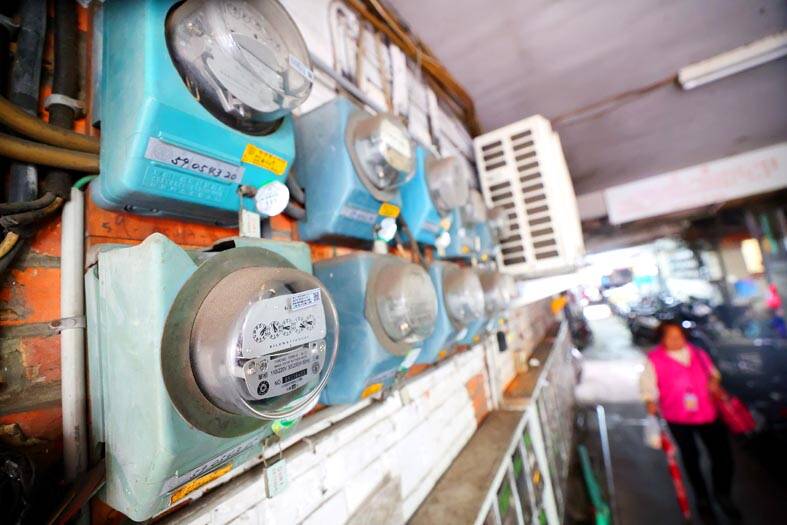Two local trade groups yesterday called for stable power supply to meet a fast pickup in demand from artificial intelligence (AI) devices and applications.
The Third Wednesday Club (三三會) and the Chinese National Association of Industry and Commerce (CNAIC, 工商協進會) raised the issue ahead of an electricity price review committee meeting convened by the Ministry of Economic Affairs tomorrow to discuss electricity rates.
Lin Por-fong (林伯豐), chairman of the Third Wednesday Club whose membership is limited to the top 100 firms in individual sectors, said policymakers should adopt an incremental and fair approach when setting new electricity rates.

Photo: CNA
In the past, the ministry had spared most households and small businesses from rate hikes and made big industrial and commercial facilities bear the brunt, Lin said.
Lin disagreed. “All should share the responsibility of keeping unprofitable Taiwan Power Co (Taipower, 台電) afloat,” he said.
Taipower last year incurred NT$198.5 billion (US$6.22 billion) of losses with cumulated losses soaring to NT$382.6 billion.
Taipower could have eased its losses by raising the share of more affordable nuclear power and policymakers should do so to ensure stable power supply and prices, Lin said.
In addition, the government should extend the services of the Guosheng Nuclear Power Plant in New Taipei City’s Wanli District (萬里) and the Ma-anshan Nuclear Power Plant in Pingtung County’s Hengchun Township (恆春), he said.
Stable and affordable power supply is critical to local technology firms, which are heavy electricity users but play a key role in driving Taiwan’s GDP growth, he added.
CNAIC chairman Thomas Wu (吳東亮) said in a separate venue that the government should seriously evaluate if Taiwan has sufficient energy to meet fast-growing demand from local tech firms involved in the supply of AI chips, servers and other devices.
The nation needs to be prepared since AI applications are expected to mushroom in the coming few years, Wu said.

MULTIFACETED: A task force has analyzed possible scenarios and created responses to assist domestic industries in dealing with US tariffs, the economics minister said The Executive Yuan is tomorrow to announce countermeasures to US President Donald Trump’s planned reciprocal tariffs, although the details of the plan would not be made public until Monday next week, Minister of Economic Affairs J.W. Kuo (郭智輝) said yesterday. The Cabinet established an economic and trade task force in November last year to deal with US trade and tariff related issues, Kuo told reporters outside the legislature in Taipei. The task force has been analyzing and evaluating all kinds of scenarios to identify suitable responses and determine how best to assist domestic industries in managing the effects of Trump’s tariffs, he

TIGHT-LIPPED: UMC said it had no merger plans at the moment, after Nikkei Asia reported that the firm and GlobalFoundries were considering restarting merger talks United Microelectronics Corp (UMC, 聯電), the world’s No. 4 contract chipmaker, yesterday launched a new US$5 billion 12-inch chip factory in Singapore as part of its latest effort to diversify its manufacturing footprint amid growing geopolitical risks. The new factory, adjacent to UMC’s existing Singapore fab in the Pasir Res Wafer Fab Park, is scheduled to enter volume production next year, utilizing mature 22-nanometer and 28-nanometer process technologies, UMC said in a statement. The company plans to invest US$5 billion during the first phase of the new fab, which would have an installed capacity of 30,000 12-inch wafers per month, it said. The

Taiwan’s official purchasing managers’ index (PMI) last month rose 0.2 percentage points to 54.2, in a second consecutive month of expansion, thanks to front-loading demand intended to avoid potential US tariff hikes, the Chung-Hua Institution for Economic Research (CIER, 中華經濟研究院) said yesterday. While short-term demand appeared robust, uncertainties rose due to US President Donald Trump’s unpredictable trade policy, CIER president Lien Hsien-ming (連賢明) told a news conference in Taipei. Taiwan’s economy this year would be characterized by high-level fluctuations and the volatility would be wilder than most expect, Lien said Demand for electronics, particularly semiconductors, continues to benefit from US technology giants’ effort

‘SWASTICAR’: Tesla CEO Elon Musk’s close association with Donald Trump has prompted opponents to brand him a ‘Nazi’ and resulted in a dramatic drop in sales Demonstrators descended on Tesla Inc dealerships across the US, and in Europe and Canada on Saturday to protest company chief Elon Musk, who has amassed extraordinary power as a top adviser to US President Donald Trump. Waving signs with messages such as “Musk is stealing our money” and “Reclaim our country,” the protests largely took place peacefully following fiery episodes of vandalism on Tesla vehicles, dealerships and other facilities in recent weeks that US officials have denounced as terrorism. Hundreds rallied on Saturday outside the Tesla dealership in Manhattan. Some blasted Musk, the world’s richest man, while others demanded the shuttering of his